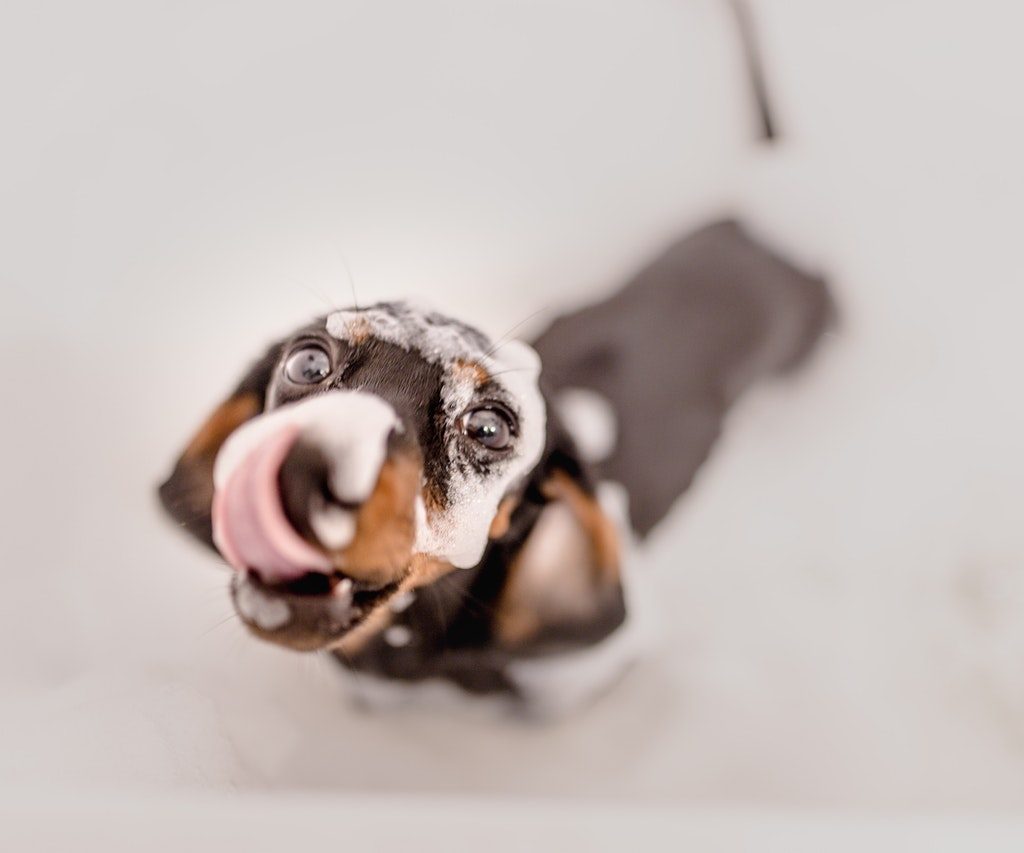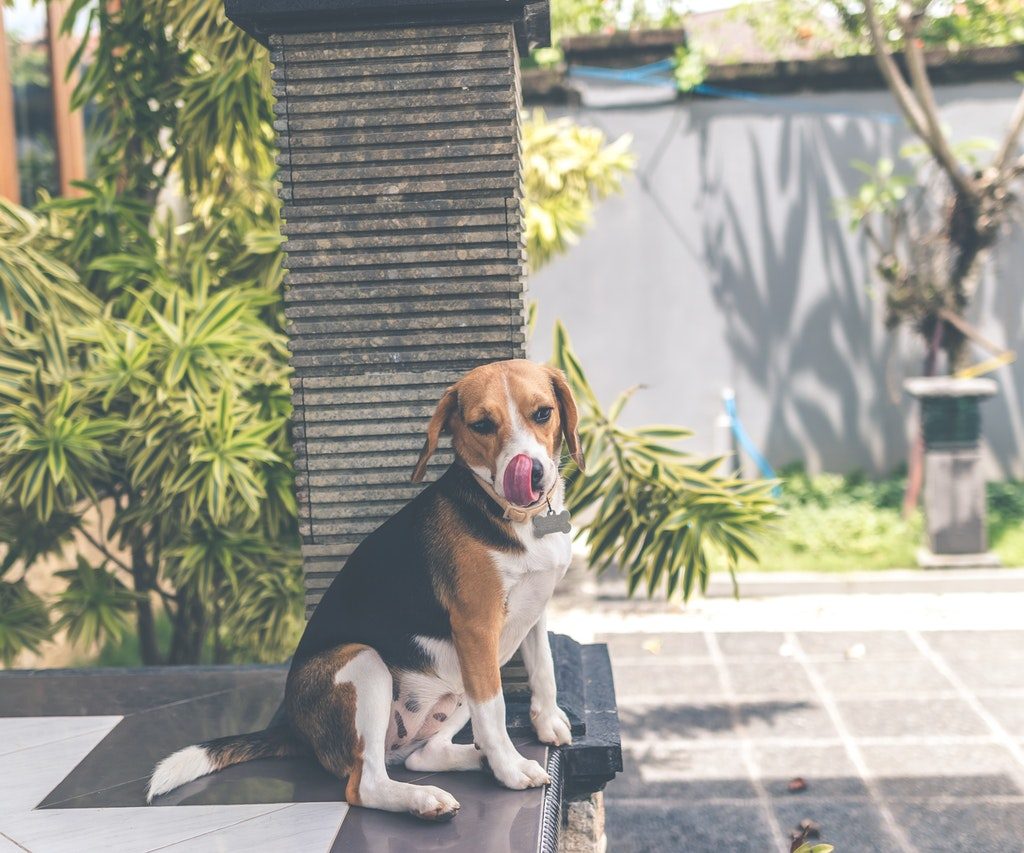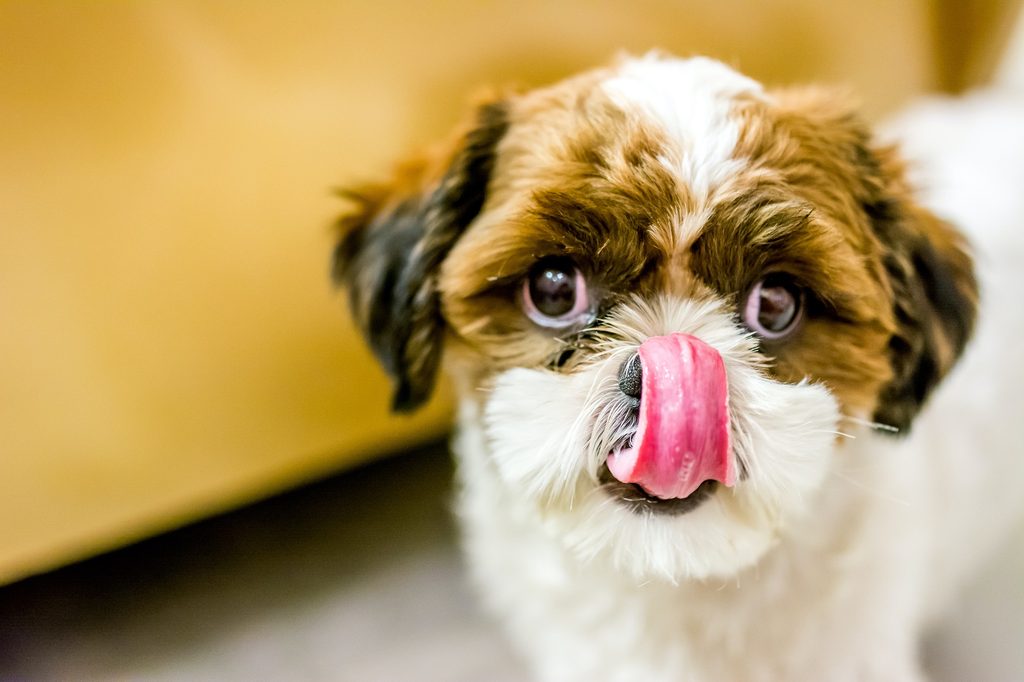
As much as we love our canine companions, sometimes dog behavior can be annoying. From incessant barking to the late-night zoomies, dogs can try our patience. A lot of dog behavior is endearing and adorable, though! No matter how annoyed you might get at your pup’s irritating behavior, one tilt of the head or cute little smile is all it takes to earn forgiveness. Dogs licking their lips ranks high up on the list of the most adorable canine quirks, but why do dogs lick their lips?
Like wagging their tails, dogs lick their lips as a form of communication. However, a dog licking lips is a little trickier to understand. If you want to understand your dog better, then you’ve come to the right place. We’ll take a closer look at one of the most common dog behaviors and figure out what all this lip licking is about — and when you should be concerned.

Why dogs lick their lips
Because our pups can’t speak to us using words, they send signals using their body language. It’s up to us as their pet parents to learn to read that language. According to animal behaviorist Patricia McConnell, there are several reasons why dogs lick their lips. Those reasons include:
- Anticipating a meal
- Appeasement (also known as submissive or calming signals)
- Anxiety
- Health issues like oral discomfort or nausea
Let’s take a closer look at the different reasons why dogs lick their lips, what you should do about it, and when you should seek help from a veterinarian.
Your dog smells something appealing
One of the most common reasons dogs lick their lips is simply because they smell something appetizing. Whether you’re opening a can of your dog’s favorite food, or you’ve just made a tasty treat for yourself, the scent can cause your dog to lick their lips. It also causes their mouth to water. Not only is this an involuntary response to the anticipation of food, but saliva production also helps prepare the teeth to chew and the stomach to digest its upcoming meal. The same biological response happens to us.
Your dog is sending you a message
When dogs perceive a person or another animal as a threat, they lick their lips in a show of appeasement. “I won’t hurt you,” the gesture says. Lip licking is commonly seen after you scold your pooch for doing something naughty, like eating a roll of toilet paper or urinating indoors. Because dogs can’t understand what we’re saying, they don’t understand that you’re scolding them because of their behavior. Instead, your body language and raised voice are perceived as a threat, which results in your dog displaying submissive behavior. It’s important to note that submissive behavior can escalate and turn defensive if your dog continues to feel threatened. Give your pup space and time to calm down, and use positive reinforcement instead of punishment when they misbehave.
Your dog swallowed or inhaled something
All dog parents know that sometimes our pups ingest things they shouldn’t. If you find your dog licking their lips frantically after you’ve been playing in the yard, it’s possible they swallowed or inhaled something like a foxtail burr (a long, spindly structure that resembles dried pampas grass) or a grass burr (those awful spiky things we step on when we walk barefoot in the yard). If you suspect your dog has ingested or inhaled a burr, you should take them to the vet immediately.
Your dog feels nervous
If you notice your dog licking their lips when you’re out for a walk, the TV is playing loudly, or you have guests over, chances are good that your pup is feeling anxious. As much as you want to comfort them, this can reinforce their anxiety. Just as scolding your dog when they misbehave is a reward (attention), babying your pooch when they’re feeling nervous sends the message that displaying anxiety will garner attention. Instead, redirect their attention by asking them to sit or shake. When your dog complies, you’ll be able to reward good behavior rather than anxiety.
Your dog has an underlying health condition
Dogs also lick their lips if they’re suffering from nausea or oral discomfort related to a sore tooth or an infection in the mouth. If your pooch has lost interest in food and started licking their lips frequently, it’s time for a trip to the vet. Your dog could be suffering from an infected tooth or ulcerated gums. Similarly, lip licking can be a sign of nausea. You’ll want to take your pup to the vet to rule out gastrointestinal problems if they’ve been vomiting, suffering from diarrhea, or showing signs of constipation. Other things to look out for include lethargy and loss of appetite.

What should you do if your dog is licking their lips?
- When you’re making food: You have nothing to worry about if your pup licks their lips while you’re preparing food. They want a tasty treat, and they hope you’ll drop something on the floor.
- When your dog is in a social setting: If your dog licks their lips in social settings, it’s best to remove them from the area and give them time to relax. Their lip licking could mean that they feel anxious, or they may be displaying an appeasement behavior.
- When you can’t find another cause for the behavior: If your dog licks their lips when there’s no food and no reason for them to be anxious, it’s never a bad idea to see the vet.

What other behaviors should you look out for?
When figuring out why your dog is licking their lips, there are a few other behaviors you can use as context clues. Focus on your dog’s tail, ears, and breathing. You’re probably already accustomed to watching your dog’s tail to see if it’s wagging or drooping, and their ears can be used similarly. Ears that are perked up and forward is a sign of alertness (or excitement when paired with a wagging tail), while flattened ears is a sign of fear, anxiety, or discomfort.
It’s normal for dogs to pant or breathe heavily when they are exercising or are hot, but if they aren’t running around and the weather is mild, then it can be a sign of distress or pain. So if your dog is licking their lips and you aren’t sure why, check the rest of their body language to see what their mood is.
Lip licking is generally a normal response in dogs, but it also could mean something is wrong. It’s our job as pet parents to get to the bottom of our dogs’ behaviors. When in doubt, speak to a professional.



